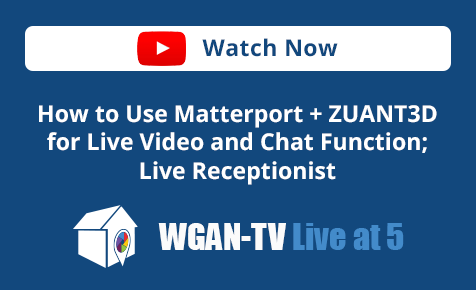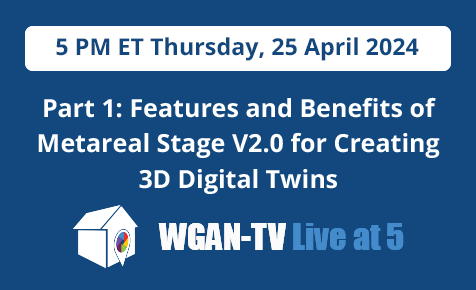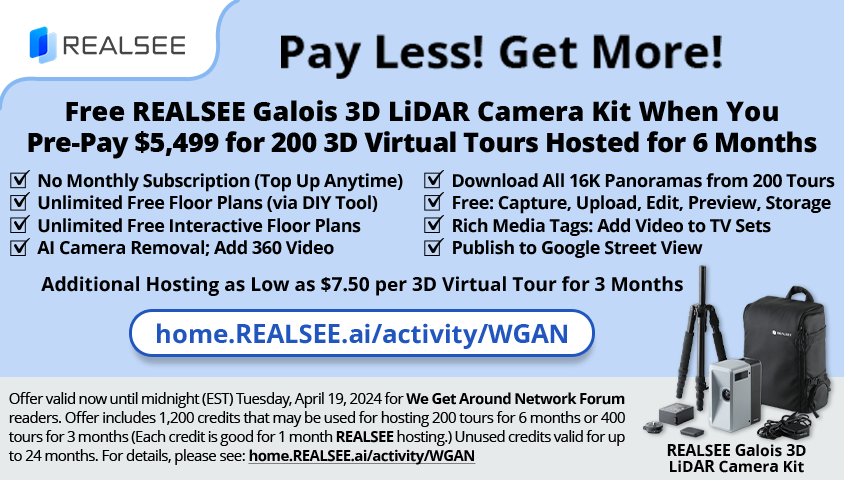Looking to purchase a DSLR12151
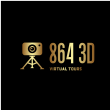 WGAN Standard WGAN StandardMember Greenville, South Carolina |
8643d private msg quote post Address this user | |
| As of now, I am capturing 3D tours with a Z1 and producing stills from my Matterport Tours. This has worked out fine and I have only had one realtor complain out of a dozen, but I feel like I could offer better quality photography with a DSLR. Also, some realtors want only photography, but I still have to shoot a Matterport tour to obtain the stills. Here are some examples of my work. Some of the exteriors were taken using my Mavic Pro. clickable text clickable text Should I keep using my current technique or purchase a DSLR? I’d like opinions on cameras and lenses for a beginner like me. The DSLR must be able to produce high quality video as I’m also looking to add videos as an option. I’ve done some research and was thinking maybe the Nikon D750, any thoughts? Do I need to spend that much? What lens would you recommend for the D750? Thanks as always for your inputs! |
||
| Post 1 • IP flag post | ||
 WGAN WGANStandard Member Bon Secour, Alabama |
Chemistrydoc private msg quote post Address this user | |
| Hi There - I shoot with a Nikon D750 and have great results. My main lenses for real estate are: Tokina Opera 16-28mm, and Tokina AT-X 28mm - 70 mm. These have a great balance of quality and price. The Nikkor 14-24mm is exceptional, but will cost $s. I have two D750 bodies, and these are both used daily for over 2 years, with no real issues. If I were starting from scratch, I would probably look into a mirrorless setup - probably Sony. But, you do need to position yourself to supply high quality photos. I use mainly ambient HDR, which does fine for my needs and those of my clients. Best wishes to you. Keith |
||
| Post 2 • IP flag post | ||

|
JonJ private msg quote post Address this user | |
| Hi @8643d! I am currently using a Canon 80D primarily with a Canon 10-18mm lens. I also use a Sigma 18-35 f1.8 for close in shots. This is a great camera and lens combo for both photos and video. If you are going to incorporate video, I recommend getting a gimbal as well. Here is a link to a recent shoot for some example images. Example Photos These were all done with 5 exposures -4, -2, 0, +2, +4. That being said, I usually expose 1 or 2 stops below metered. Beyond the equipment, I would encourage you to find someone experienced in real estate photography to learn the ropes. If you are looking for reasons to get a dedicated camera for traditional photography, here are a couple. 1) Better image quality 2) Access to more clients that require photography only 3) Best ROI that you can get!$!$!$ 4) Videos! Good Luck! Jon J |
||
| Post 3 • IP flag post | ||
|
|
ron0987 private msg quote post Address this user | |
| @8643d why not consider mirrorless Nikon Z50, z6. Cannon Sony any of the other mirrorless cameras I just think this is going to be the wave of the future and I think any of those would work great and you are not tied to a current brand or lense. Just my though. | ||
| Post 4 • IP flag post | ||
 WGAN WGANStandard Member Bon Secour, Alabama |
Chemistrydoc private msg quote post Address this user | |
| @ron0987 - I wake up most days wishing that I were starting from scratch! If I were, hands down, Sony mirrorless! Much as I love my Nikon setup, I have long recognized that it's on a glide path to obsolescence! @JonJ - I've always been impressed at how clean and crisp your photos look. Also, kudos for shooting straight on (most of our local photographers do a series of diagonal room shots to avoid having to align both vertically and horizontally). Very nice work. |
||
| Post 5 • IP flag post | ||

|
Expertise private msg quote post Address this user | |
| Dont spend a [redacted] ton of money. Like Jon said, the 80D does a great job. "Refurbished" straight from Canon for $719. Canon website Pick up a 10-22 for $438 and you're good for years. Canon site We've bought numerous cameras and lenses refurbished from Canon. |
||
| Post 6 • IP flag post | ||
 WGAN Fan WGAN FanClub Member Queensland, Australia |
Wingman private msg quote post Address this user | |
| That's probably won't fit all purposes for you because it cannot do 4K videos but have a look at what Canon 5DS(R) can do. They have 50MP sensors and can produce crystal clear 135Mp panos. However you realy need a full frame lens(Canon 8-15mm) that costs as much as Canon 5DS(R) body. Still both can be bought brand new for about $2200 USD in total. https://www.dpreview.com/forums/thread/4142536 I am trying to get the lens first second hand for a reduced price and then get a brand new Canon 5DS body. If you do not want to spend much you can go with APC-S Sony A6xxx and a fisheye lens. I use A6000 and Mieke 6.5mm(total cost less than 500 USD) and it makes about 64MP panos. All you need is four pictures to create a pano with it. Do not forget to account for PTGui license cost for stitching. Some are using free Hugin stitching software but I have had some troubles with stitching with it while PtGui just does it with default settings. |
||
| Post 7 • IP flag post | ||

|
JonJ private msg quote post Address this user | |
| @Chemistrydoc, Thank you for the kind words! It certainly helps when you have a beautiful subject to photograph. Jon |
||
| Post 8 • IP flag post | ||
 WGAN Standard WGAN StandardMember Greenville, South Carolina |
8643d private msg quote post Address this user | |
| @Chemistrydoc which Sony model would you recommend? And lens for it? | ||
| Post 9 • IP flag post | ||

|
homefinders3d private msg quote post Address this user | |
| The Canon 90d does 4k. 7 shot AEB etc.. I use mine with a Canon EF-S 10-21 that I bought for $949 the week they came out and now they list for $550 - it's a great lens at that price. I used Nikon for over 30 years and switched to Canon when the 10D came out. You can't go wrong with Nikon, Canon, Sony, Fuji etc.. If I was starting out I'd probably buy mirrorless though. I would think most any APS-c or full frame with a super wide zoom would produce better results than images taken from a tour. I would take a look at some of the REP youtubers and try to determine what technique you want to utilize. If you want to shoot HDR you will prob need Lightroom, Photomatix or one of the other software packages (or several). If you want to shoot flash/ambient you will need to buy a flash or flashes lol. I'm just suggesting that it will be easier to budget if you have an idea of what path you want to take. My post is based on the understanding that you are looking for a DSLR for stills and not panos. | ||
| Post 10 • IP flag post | ||

Houston |
briangreul private msg quote post Address this user | |
| I'll be blunt and then explain. If you aren't prepared to spend at least as much on a DSLR as you did on your Matterport rig, then don't go there. I think the 5D MK I/II/III/IV etc is overkill for RE Photography. It's a low-end professional camera. The 1D is stupid expensive and Canon's best, in theory. I had a 7D which was nice, but had overheating issues. I also have a 40D at one point. Prior to that I had Pentax cameras and I've been stranded by Sony a time or two when they decided to abandon what I owned. I currently shoot a 6D. My GoTo lens is a 17-40mm RedLine. I have it on a Manfrotto 055X with a video head for pan/tilt. That's probably $3500 right there. The 6D has excellent low light sensitivity, it's a full frame sensor, and it will play nice with any of Canon's other toys like Speedlites. It's capable of doing 7 shot AEB and still takes respectable flat photos. A large full frame sensor is a must. Larger imaging area equals 35mm equivalence. To really understand this look at this photo: 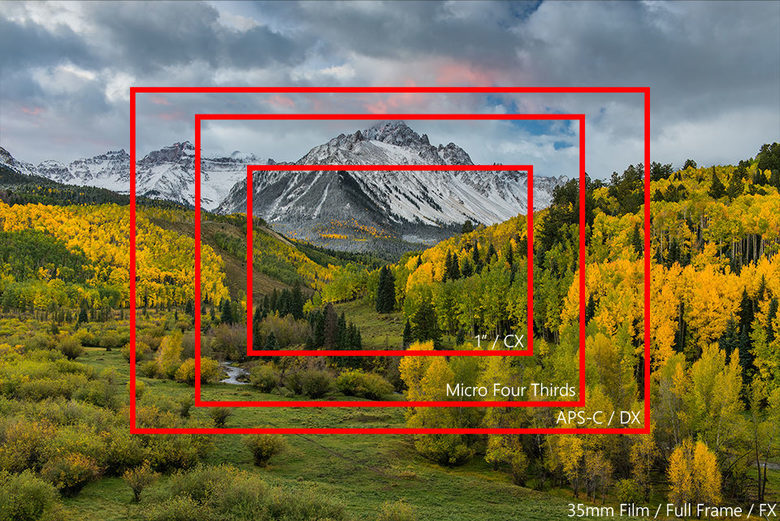 View is everything. You need a wider lens with an APS-C camera than I do with a full frame camera. That will cost you in money and distortion. Now that we have that out of the way, let's talk about pixels. A pixel is the imaging sensor element that reflects a dot of light. The smaller you make it, the more amplification is needed electronically. Amplification causes noise, which shows up as "artifacts" in your image. To make this simple, you want a large sensor that needs less amplification. You will pay dearly for a good sensor. This is why my iPad Pro 2020 with it's 1/8th inch sensor can't match my EOS 6D with it's 35mm sensor. The tiny sensor requires lots of amplification. It still takes nice pictures, but there is a huge difference. Lastly, there is fidelity, or how many colors the camera can perceive. Mavic 2 Pro is a 10 bit raw camera which means it can pick up 1 Billion colors. This shows up in faint details that might get lost or washed out with a lower grade sensor. I suspect there is some marketing magic going on there... because the Canon 6D is a 14 bit a/d camera and I assure you it takes better photos. Anyhow, just don't overlook this piece of the puzzle. Here are some examples: 1" Hasselblad sensor in a Mavic 2 Pro, "flat" non-HDR photo: https://www.flickr.com/photos/hotpuppy/49930288351/ Same photo with a 5 shot AEB combined to HDR: https://www.flickr.com/photos/hotpuppy/49930592387/ Same camera, flat NADIR (overhead) photo: https://www.flickr.com/photos/hotpuppy/49930593007/in/photostream/ Same camera, HDR NADIR: https://www.flickr.com/photos/hotpuppy/49930593172/in/photostream/ Canon EOS 6D, HDR Photo (7 AEB -> HDR) the image size on Flickr probably doesn't do it justice. But it is a clearer and crisper photo. https://www.flickr.com/photos/hotpuppy/49929769848/ Same photo with some color adjustments to make the sky blue and the grass greener. (roll eyes and shake head) But it's pretty. https://www.flickr.com/photos/hotpuppy/49929770083/in/photostream/ Taking the photos is one part, editing them in Lightroom etc is the other. Just for fun, here is a Macro photo that the 6D did with my MP-5E lens. https://www.flickr.com/photos/hotpuppy/49864779866/ |
||
| Post 11 • IP flag post | ||

|
homefinders3d private msg quote post Address this user | |
| @briangreul you're confusing Real Estate Photography with architecture photography lol. I bought a 5D, a 10D, 20D, 60D and a 90D. I can show you a lot of nationally acclaimed real estate photographers that will tell you that a full frame is nice but not necessary. I have used a Canon 17-40 for 17 years - very nice lens, the 10-22 EF-s is just as effective for Real Estate. I'm having flash backs to pre-digital: :pros only use medium format". Obviously buy the best your budget allows. It's kind of like saying that you have to have a PC lens to shoot real estate. @8643D you stated that all but one of your customers find your current work flow of using stills taken from a tour created with a Richoh Z-1. I can't imagine any being displeased with a final product produced by any of todays prosumer ditial cameras. The Canon EF-S 10-22mm has a 35mm equiv FOV of 16-35mm. I used my 17-40 L on my 5D and the 10-22 on the APS-C's, the 10-22 seemed a little wider than 16mm. A lot of RE photographers shoot at 200-400 ISO and so noise is not usually a huge problem. | ||
| Post 12 • IP flag post | ||
 WGAN Fan WGAN FanClub Member Buffalo, New York |
GETMYVR private msg quote post Address this user | |
| Dang, so now I must get a DSLR or other stand aloneCameron it makes sense as many of you cited that some people just want real estate photography and no sense breaking out a matterport pro two 3D and go through all the process. Quick question because to me it looks like the widee angle shots are the ones that I would do for my real estate clients. what is the preferred millimeter range for lenses it can be a little confusing because there's so many different options out there but for you guys that do shoot the real estate photography with a regular camera what millimeter lens should we be looking for? Thanks in advance! |
||
| Post 13 • IP flag post | ||
|
|
ron0987 private msg quote post Address this user | |
| @Chemistrydoc oh ya I wish I could start all over to. @JonJ Also great photos really like your work. |
||
| Post 14 • IP flag post | ||
 WGAN Fan WGAN FanClub Member Buffalo, New York |
GETMYVR private msg quote post Address this user | |
| @briangreul thanks, I think this is what I was looking for. | ||
| Post 15 • IP flag post | ||

|
homefinders3d private msg quote post Address this user | |
| I'd bet money, that most REP's shoot between 15-19mm. The Real Estate Photographers forum does a survey every year I believe. https://photographyforrealestate.net/the-most-popular-lens-for-real-estate-photography-canon-10-22mm/ | ||
| Post 16 • IP flag post | ||
 WGAN Fan WGAN FanClub Member Buffalo, New York |
GETMYVR private msg quote post Address this user | |
| What is the significance of the f numbers I see... F/1.4 1.8 2.8 4.0 etc? | ||
| Post 17 • IP flag post | ||

|
JonJ private msg quote post Address this user | |
| Thanks @ron0987! @GETMYVR, whenever anyone asks me, I recommend that they shoot with a 16-XXmm full frame equivalent lens. So for my Canon crop sensor camera, I shoot with a 10-18mm lens. Canon cameras have a crop factor of 1.6. So, you multiply the focal length by the crop factor to get the full frame equivalent (16-28.8mm). For Nikon, the crop factor is 1.5, so the same 10-18mm lens has a full frame equivalent focal length of 15-27mm. In general, I am usually closer to 10-11mm for most of my shots. As for lens distortion, most issues can be corrected in post. Editing software have lens correction profiles to correct any issues with lens distortion, vignetting and chromatic aberration. Finally, I would recommend that for every $1 you spend on gear, you spend $1-$2 on education. Even the best gear will produce poor images if you don't know how to use it correctly. Let me know if you have any other questions! Jon |
||
| Post 18 • IP flag post | ||

|
homefinders3d private msg quote post Address this user | |
| The smaller the number, the larger the aperture = more light and more cost. Most REP doesn't require a fast lens (larger aperture). | ||
| Post 19 • IP flag post | ||
 WGAN Fan WGAN FanClub Member Buffalo, New York |
GETMYVR private msg quote post Address this user | |
| @JonJ thanks so much. | ||
| Post 20 • IP flag post | ||

|
homefinders3d private msg quote post Address this user | |
| If you like to watch Youtube videos: Nathan Cool, Rich Baum. Inexpensive online course: Thomas Grubby on Kelbyone. | ||
| Post 21 • IP flag post | ||

|
JonJ private msg quote post Address this user | |
| The "f numbers" represent the maximum aperture that the lens has at that particular focal length. Some lens have a fixed aperture and others have a variable aperture. The aperture is one aspect of the exposure triangle (ISO, aperture and shutter speed). So by changing this value, you let more/less light to get to the sensor (all other things being equal). Another variable that is effected by aperture is the "depth of field". A narrow depth of field (large aperture) will only have items in focus that are close to the focal plane while a wide depth of field (small aperture) will have more of the image in focus. For real estate photography, it is recommended that you are in the range of f8-f11. This will help to ensure that all items in the photo are sharp and in focus. | ||
| Post 22 • IP flag post | ||
 WGAN Standard WGAN StandardMember Greenville, South Carolina |
8643d private msg quote post Address this user | |
| @JonJ any suggestions on education options? | ||
| Post 23 • IP flag post | ||
 WGAN Standard WGAN StandardMember Greenville, South Carolina |
8643d private msg quote post Address this user | |
| @homefinders3d Thanks. I’ve watched some of Rich Baum videos on editing. I’ll check out Nathan Cool and look into the online course as well. Looking to educate myself as much as possible. | ||
| Post 24 • IP flag post | ||

|
homefinders3d private msg quote post Address this user | |
| you can pick up some good info on the photographyforrealestate website. | ||
| Post 25 • IP flag post | ||

|
homefinders3d private msg quote post Address this user | |
| @8643d if you are considering buying used, look out for the price of used Canon R mirrorless cameras to drop as the R2 is released. Someone also mentioned that if you are going to shoot video with the DSLR that you might want to consider a stabilizer. That's a good idea and will start another debate on which is the best stabilizer lol. Once you solve your camera choice dilemma, then you can deal with the HDR, ambient, single flash, multi-flash and Flambient debate |
||
| Post 26 • IP flag post | ||

|
JonJ private msg quote post Address this user | |
| @8643d, Unfortunately, I do not have a good recommendation for a course for someone who is getting started. However, the suggestions that @homefinders3d has made are all good recommendations. The only warning that I will say is that you really need to understand what your business goals are as a real estate photographer. A lot of the content created by the photographers will certainly help you to create amazing images, but there is a cost. Usually the techniques that they teach are more time consuming and require additional equipment. This is not a problem if your business goals are to cater to high-end listing agents that can afford more expensive marketing. If your goal is to pursue clients in the "bread and butter" segment of the real estate market, then I would suggest learning a more "run and gun" approach. For me, I watched a lot of YouTube videos from a lot of different photographers. I didn't know what I didn't know. I did not know who didn't know what they were talking about and who were experts. I had to piece everything together myself and figure out what would work for me. That being said, if I were to do it all over gain, I would find someone with a good portfolio and with a style that is in line with my business goals. From there, I would reach out to them and see if they would be willing to train and mentor me. If you are unable to find a course that works for you or a mentor, I will eventually create my own course. However, I have been saying that for the last 3 years....If all else fails, you could always make a trip to Charleston. |
||
| Post 27 • IP flag post | ||

|
homefinders3d private msg quote post Address this user | |
| The beauty of digital is you can shoot 1000's of images and practice. You can also preview your initial results on site. It's a lot easier to learn by trial and error when you don't have to wait a week for the results and pay for the bad ones as well as the good ones lol. | ||
| Post 28 • IP flag post | ||

Houston |
briangreul private msg quote post Address this user | |
| @homefinder3d - you can use a Kodak disposable camera if you want, or an iPhone. It's just going to look like that's what you used. If someone was investing in a camera, my advice is still to buy the best full frame sensor you can get. Even an older 5D Mk1 would be fine, I had one for a while and it was a nice camera. My 7D had video and the 6D has the ability to autofocus in video. A good used Canon or Nikon is going to stand the test of time, batteries are widely available OEM or Aftermarket. A quick check on eBay suggests you could get a 6D for $500 ish and a 5D for about the some money, Mk1 or Mk2. You get what you pay for with lenses. The problem with a crop sensor or smaller sensor is that you need a wider lens to get the same scene. Very short lenses introduce aberrations, both distortion and color. The biggest issue here is that the focus on the center of the lens won't be the same as the edges. Some software can adjust for this with some lenses/camera. While I agree we are not shooting for Architectural Digest or Nat Geo, most Agents want those images. Usually for the AirBnB price. Therefore, my advice still stands to someone looking to invest in a camera and lenses. Buy the best you can afford in a proven, stable brand. You can learn photography with good equipment. That's not to say you can't work magic with throw-away cameras. One of my better selling images was shot with a Nikon I bought at WalMart on a dive trip after my Canon SureShot100 flooded. It's just alot easier to do great work with a great camera. As for photo classes, look for a photography school in your area that is a non-profit. In Houston I took classes from Houston Center for Photography. https://hcponline.org/ They are affordable and taught by local pros who want to help others become better photographers. Online is also good, but I recommend in person because there is more individual interaction and coaching. Now, none of us seem to have touched on why Matterport images aren't ideal for listing photos. So let me share my view: 1- Small sensor. The sensor in the camera is small, which means there are fundmamental issues with the output. 2- Not raw. This means you are starting with a compressed, highly skewed image to begin with. Raw images are just sensor data that can be more easily manipulated. The advantage of doing this in a program like Lightroom is that the manipulation is stored separately from the image and can be changed or undone later. 3- Composition. You are at the mercy of the wonderful Matterport app to decide how your room should look. Feeling lucky? I regularly modify my zoom to include or exclude elements. Cropping and composition literally make the photo. You don't want to see everything everytime. You want to show something to tell a story or vision. In REP the vision is that the prospective buyer sees themselves having a wonderful life in the home. I'll leave you with another analogy. You could write a story with a crayon, a pencil, or a pen. One would be okay, one would be preferred, and one would be laughable. In the photography world the Matterport is a lumber crayon. It's very good at one specific task and laughable at the others. You wouldn't mark lumber with a pen, and you shouldn't write a story with a lumber crayon. |
||
| Post 29 • IP flag post | ||

Houston |
briangreul private msg quote post Address this user | |
| Here is a good article on distortion. He's focused on 24mm and 55mm lenses. It's going to get alot worse down at 10mm where you need to be in a crop sensor to equal the 17mm on a full frame sensor. https://clickitupanotch.com/lens-distortion/ The advantage of using a great lens with a full frame sensor is that the distortion has been minimized. You are paying for that fancy glass. Anyhow, I'd be remiss if I encouraged someone to do anything less than their best. There is one other thought that comes to mind. If you show up with a $400 camera on a $50 tripod and use all automated settings, what makes you think the agent won't do the same thing? I think the reason they hire us is to achieve results that they don't have the equipment or expertise to achieve themselves. |
||
| Post 30 • IP flag post | ||
This topic is archived. Start new topic?

